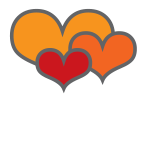Our Transitional Living Program
Program Overview
Good Hearts’ Transitional Living Program is designed to serve young adults 16 – 22 years of age who have graduated the eighth grade and are continuing their education in high school or college in a transitional living group home setting. Foster parents and Good Hearts staff are specially trained to provide specific services that focus on life and social skills taught in individual and group settings to these young adults in need of a structured living environment.
Good Hearts’ Transitional Living Program provides residential care for young men and women in an atmosphere that is safe and nurturing until such time that the young adult is able to live independently. The program is dedicated to preparing young adults to transition into their communities with financial income, dignity, self-discipline, and self-reliance.
Young Adults Served
Inclusionary Criteria
Young adults who are eligible for admission into Good Hearts’ Transitional Living Program are those that meet the following eligibility criteria:
- male or female;
- between 16 and 22 years of age;
- enrolled in a high school, vocational school, and/or or post-secondary education program; and
- willingness to obtain and/or maintain employment.
Exclusionary Criteria
Good Hearts will consider young adults to be ineligible for admission if the young man/woman:
- is under the age of 16;
- acts on predatory sexual tendencies;
- has an IQ < 70;
- is currently chemical dependent;
- is currently psychotic;
- has attempted suicide within the last six weeks;
- has expressed and acted on homicidal tendencies within the last six weeks; and/or
- has set fires within the last year.
However, Good Hearts will review all referrals and make exceptions as necessary after reviewing all available information.
Services Offered
- attendance to basic physical and emotional needs (e.g., food, clothing, nurturing, etc.);
- Ansell-Casey Life Skills Assessment to assess strengths and needs in life skills;
- life skills programming such as workshops and ongoing psycho-educational groups related to personal finance, opening a checking account, interviewing skills, housing, decision-making and problem-solving, sexual development and education, substance use/abuse, housekeeping and laundry skills, personal hygiene, general healthcare, general safety and fire safety practices, food preparation and nutrition, transportation skills, health and safety, child development, and parenting skills (if the young adult is a parent of a child living with him/her), and accessing and utilizing community resources;
- Transitional Living Allowance (TLA) up to $1000 (distributed in increments up to $500 per month for youth who participate in PAL Life Skills training, to help youth with initial start-up costs in adult living); ;
- After Care Room and Board (ACRB) assistance, based on need, up to $500 per month for rent, utility deposits, food, etc. (not to exceed $3000 of accumulated payments per youth);
- teen conferences;
- leadership development activities;
- specialized therapy services including individual and group therapy;
- substance use/abuse programming (if needed);
- sexual education services (reproductive health, healthy romantic relationships, being sexually responsible, sexually transmitted diseases, pregnancy prevention, etc.; and
- additional supportive services, based on need and availability of funds, such as mentoring services and driver’s education.
